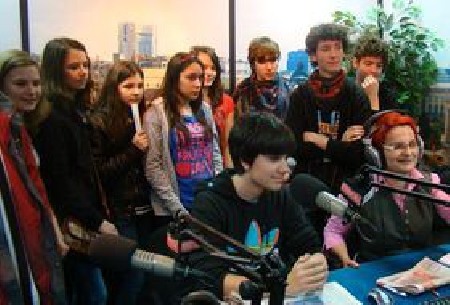A Different Type of School
All those who had been dreaming about unconventional education methods, with history lessons held on the street in front of heritage buildings or with improvised botany classes delivered during mountain trips, saw their wishes come true last week. For the
Warning: Trying to access array offset on null in /home/web/rri.ro/public/wp-content/themes/rri/template-parts/content.php on line 53

Warning: Trying to access array offset on null in /home/web/rri.ro/public/wp-content/themes/rri/template-parts/content.php on line 98
Eugen Cojocariu,
26.04.2012, 16:05
Between the 2nd and the 6th of April, ordinary classes were replaced by extra-curricular activities. One such activity involved a visit to the public radio. Virginiana Bogdan, an English teacher at the Maria Rosetti School in Bucharest tells us more about her class’s activities as part of “A Different Type of School” programme:
“My pupils are in the 8th grade and, although they don’t yet have to choose their future profession, they soon have to choose a high school that provides them with the training necessary for a future profession. I talked to their parents and decided to introduce the children to other professions than those they hear about every day: doctor, teacher or economist. We also wanted them to do more physical exercise and become involved in more cultural activities. This week, we will be walking through some of the older areas in Bucharest with a guide who will tell us about the buildings and monuments in the old part of the city.”
The children naturally welcomed the idea of a different type of school that involved being in the city rather than staying in school. Emilian Diaconu is in the 8th grade:
“I think it’s a great idea, but I didn’t like that at first we were supposed to stay in school and do all those different types of activities in the classroom. I didn’t think that was a good idea.”
Although she basically agrees with Emilian, his colleague, Teodora has a slightly different opinion:
“Children may relax and take part in cultural activities at the same time. I’d also like to go out of the school more, but we have to realise that if all children were on the streets at the same time, there would be chaos. We have to organise ourselves and try to do as many activities as possible in school.”
Madalina, another 8th-grade student, also believes that innovative and creative teaching methods should be used more often:
“If we had these programs more times a year, maybe it would be too much. But two weeks a year is just fine. Plus, it would be nice if we had more out of school activities during the school year.”
Civil society teaching experts also hailed the Ministry’s initiative for emphasising creativity and innovation. As students spent a week away from their school, in their native towns or regions, the local community also had to contribute. Anca Nedelcu is a teacher at the Faculty of Psychology and Pedagogy and an expert with the The Education 2000+ Center non-governmental organisation. Here is what she told us:
”This programme requires a lot of creativity from the school and the community. We can’t go visit the same places again and again. That is why we need a lot of creativity and different activities. This is why “A Different Type of School” should stimulate not only teaching institutions, but also museums, for example. They should renew their collections and create children’s workshops. Some are already doing this. We should also have a science museum, which we don’t have at the moment, where children can go and see how sound and light travel, for instance. As long as the offer coming from outside the school is limited, the school is left alone with the task of developing children’s creativity.”
As students are really keen on changing the way in which classes are held, creativity shouldn’t be limited to one week a year. Here is Anca Nedelcu again at the microphone:
“School should be different. It should be stimulating, fun and creative all the time. We shouldn’t just tick a week of creativity on our requirement list and then go back to the strictness of traditional teaching methods. We should eliminate traditional classes and have more than one special week a year when we can do things differently.”
So we can only hope that the lessons in creativity learned during this first week of “A Different Type of School” will be applied throughout the rest of the year.






























